New musical ‘Big Fish’ could be a whopper, but still lacks pizazz to make a real splash
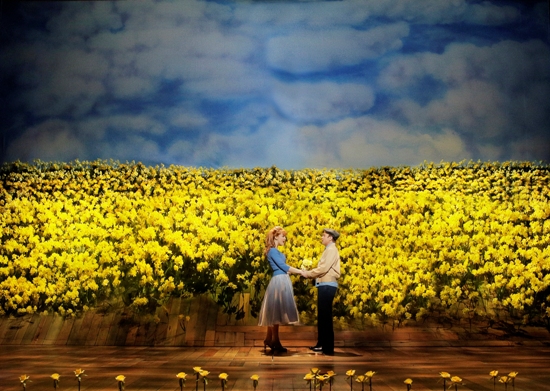 Review: “Big Fish,” with music and lyrics by Andrew Lippa and book by John August, directed by Susan Stroman, in a pre-Broadway run at the Oriental Theatre through May 5. ★★★
Review: “Big Fish,” with music and lyrics by Andrew Lippa and book by John August, directed by Susan Stroman, in a pre-Broadway run at the Oriental Theatre through May 5. ★★★
By Nancy Malitz
Edward Bloom was a big fish in a small pond, a captivating story-teller who fed on the admiration of others, a successful traveling salesman who polished his fables as he expanded his territory. His yarns were so appealing that most people never bothered to parse them for accuracy.
But did you hear the one about his disillusioned boy back home? The one who grew up seeking the truth from his dad only to expect fabrication? That’s “Big Fish,” the musical undergoing its out-of-town tryout at the Oriental before heading to Broadway in the fall.
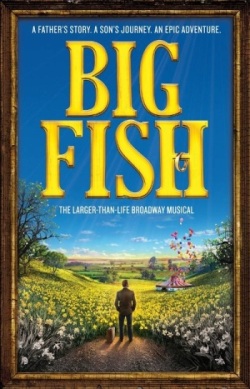 The Chicago run ends May 5, with creative tweaking expected to continue through the summer before the talented cast headlined by Norbert Leo Butz starts up at the Neil Simon Theatre in New York City. Thus early Chicago attendees are themselves a part of the experiment. Each scene is a whopper aborning as the musical betters its beats, finds its comic hooks, sharpens its focus and seeks its relevance before a live audience.
The Chicago run ends May 5, with creative tweaking expected to continue through the summer before the talented cast headlined by Norbert Leo Butz starts up at the Neil Simon Theatre in New York City. Thus early Chicago attendees are themselves a part of the experiment. Each scene is a whopper aborning as the musical betters its beats, finds its comic hooks, sharpens its focus and seeks its relevance before a live audience.
“Big Fish” the 2013 musical follows upon “Big Fish” the 2003 Tim Burton movie. Both shared John August, who wrote the screenplay and the musical’s book, and the same producers. And all are beholden to Daniel Wallace, whose 1998 “Big Fish: A Novel of Mythic Proportions” is laced with blithely ludicrous tales and bitter familial tenderness.
Enter Andrew Lippa, composer and lyricist of this new musical, and Susan Stroman, director and choreographer. Part of their challenge is the balance between the father’s persona and the son’s agenda — between the glorious escapades of this Odysseus of the American South and the son’s attempts to discover his “real” dad in the quotidien life he surely must have led.
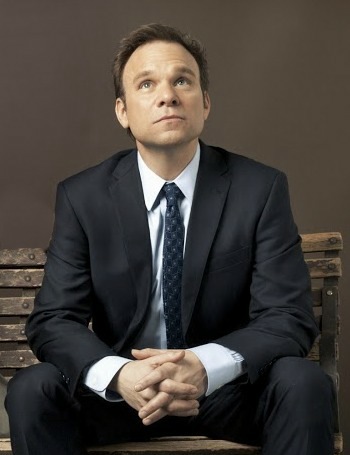 At its best, when Lippa’s songs touch on universal human truths of love, loss and identity, “Big Fish” seems like a winner, and one can understand why Stroman emphasizes the everyman yearnings at this musical’s heart every chance she gets.
At its best, when Lippa’s songs touch on universal human truths of love, loss and identity, “Big Fish” seems like a winner, and one can understand why Stroman emphasizes the everyman yearnings at this musical’s heart every chance she gets.
When Butz, as Edward Bloom, sings “Fight the Dragons” as he attempts to defend himself while inspiring his little boy and preparing him for that inevitable day when Dad can’t protect him any more, it’s a moment to savor. So is “I Don’t Need a Roof,” sung with stunning physical grace and vocal artistry by Kate Baldwin, as Edward’s wife Sandra, in a lyrical testament to the feminine spirit and the miracle of enduring love between fallible human soul mates.
But let’s face it, we audience types live for those tall tales, the one-line zappers, the jokes that double us over, the over-the-top pizazz that we can’t wait to tell others about; and it’s here that “Big Fish” the musical is still finding its way.
One of Edward’s deliciously outsized yarns is about a giant named Karl (the droll and deep-voiced Ryan Andes). The scene’s charming in the main, but it starts with unfunny shtick between Edward and Karl that needs honing in a comedy club. Lippa’s novelty number “Bigger” and Stroman’s double-extra-wide soft shoe steps face an uphill climb.
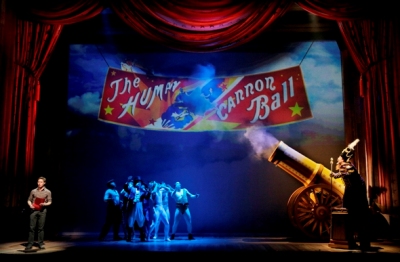 Then there’s an extended scene at a circus, where Edward recalls being first smitten by Sandra and subsequently employed. Their love-at-first-sight duet, “Time Stops,” is powerful stuff, the best thing in the scene. Most of the other circus bits are familiar tropes and stock devices, though, with the exception of an elephantine opportunity involving the hind parts of certain hairless mammals that turns out to be a colossal terpsichorean tease.
Then there’s an extended scene at a circus, where Edward recalls being first smitten by Sandra and subsequently employed. Their love-at-first-sight duet, “Time Stops,” is powerful stuff, the best thing in the scene. Most of the other circus bits are familiar tropes and stock devices, though, with the exception of an elephantine opportunity involving the hind parts of certain hairless mammals that turns out to be a colossal terpsichorean tease.
Stroman is known for her choreographic wit, and the show’s fantastic side takes off in Edward’s crock about a witch who tells his future. A haunted forest comes alive in a Disney-esque gnarl of tree trunks with anthropomorphic tendencies, and there are some lively R&B stylings by Lippa for the Witch (hearty-voiced Katie Thompson) to sing, although I couldn’t make out most of the words.
The film was filled to the brim with Tim Burton’s startling visual imagination, which stretches the real world like silly putty in bizarre and often creepy ways. It’s not the only way to tell Wallace’s story, but in truth the tale benefits from some of this outlandishness.
 Stroman’s and Lippa’s more conventional approaches to the musical’s fanciful epic side seem at times to pay deliberate homage to great Broadway classics like “Oklahoma” (cowpoke face-off) and “Gypsy” (gangly hoofers bore talent scouts) and even the tap-dancing chorus lines of old USO musicals. The footwork is great and the numbers may be fine once the overall context is established, but right now the balance seeks the idiosyncratic cleverness that will give the lionized Edward his credibility.
Stroman’s and Lippa’s more conventional approaches to the musical’s fanciful epic side seem at times to pay deliberate homage to great Broadway classics like “Oklahoma” (cowpoke face-off) and “Gypsy” (gangly hoofers bore talent scouts) and even the tap-dancing chorus lines of old USO musicals. The footwork is great and the numbers may be fine once the overall context is established, but right now the balance seeks the idiosyncratic cleverness that will give the lionized Edward his credibility.
There are scenes yet coming into focus, especially one involving the all-important first tall tale, the one about the really, really, really big fish that Edward almost catches, assisted in the telling by really, really, really big projections that seem to present such, well, enormous promise. When the creative team reels this one in, they’ll have something, but it has not yet caught the hook.
Julian Crouch’s scenic design allows for more than a dozen location changes and it goes well in hand with the projections of Benjamin  Pearcy and lighting of Donald Holder. There’s a rapidly flowing “river” down front, which offers several surprises of its own, including a tantalizing glimpse of a mermaid, who otherwise seems to have little to do.
Pearcy and lighting of Donald Holder. There’s a rapidly flowing “river” down front, which offers several surprises of its own, including a tantalizing glimpse of a mermaid, who otherwise seems to have little to do.
The stage itself leaves plenty of room for dancing, and the orchestra is stacked several stories high at the back of the stage. And despite the balance problems in the witch’s scene, the sound overall was a good mix, blissfully free of excessive volume or distortion.
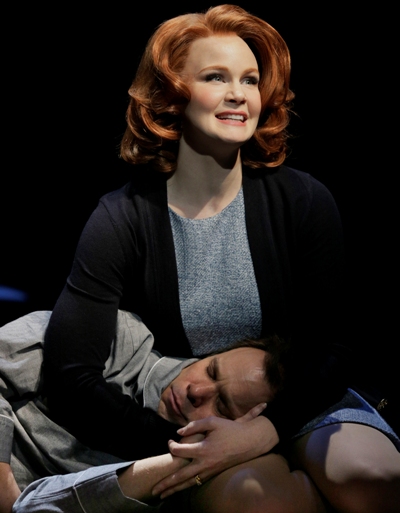 The cast led by Butz and Baldwin is up and down superb, made up of strong character types with impeccable dancing skills. Bobby Steggert seemed a notch over-driven as Edward’s frustrated son Will, but he has a very appealing tenor voice, and he joined Butz in a yearning duet — “The River Between Us” — that promises to have life as a single. The costumes of William Ivey Long do wonders for the women, but one can’t help thinking the self-aggrandizing Edward Bloom would have shown a tad more sartorial flair.
The cast led by Butz and Baldwin is up and down superb, made up of strong character types with impeccable dancing skills. Bobby Steggert seemed a notch over-driven as Edward’s frustrated son Will, but he has a very appealing tenor voice, and he joined Butz in a yearning duet — “The River Between Us” — that promises to have life as a single. The costumes of William Ivey Long do wonders for the women, but one can’t help thinking the self-aggrandizing Edward Bloom would have shown a tad more sartorial flair.
Edward’s super-sized tales really do chart a personal journey with down-home equivalents of Homer’s sirens, sorcerers and ship-eating cannibals. My reaction to this musical in its current state is that the colossal has become overbalanced by the mundane, in part because the family scenes are closer to being finished in their development.
Our traveling salesman’s life story is a triumph of human imagination in its way. The family tensions are important, well told and influential in the mix. Now if they could just keep polishing those whoppers….
Related Links:
- Performance location, dates and times: Go to TheatreinChicago.com
- Norbert Leo Butz talks about Edward Bloom and sings “Fight the Dragons”: Go to ChicagoOntheAisle.com
- Susan Stroman talks about her career: Go to AmericanTheaterWing.org
- More about lyricist and composer Andrew Lippa: Go to AndrewLippa.com
- More about novelist Daniel Wallace: Go to DanielWallace.org
- More on other touring shows: Visit BroadwayInChicago.com
Captions and credits: (Photos by Paul Kolnik except where noted.) Home page and top: Sandra (Kate Baldwin) and Edward (Norbert Leo Butz) as young lovers in Broadway-bound “Big Fish.” Official “Big Fish” poster art. Edward (Norbert Leo Butz) is a successful traveling salesman with larger than life stories to tell. Will (Bobby Steggert) doubts the story of his father Edward Bloom as a human cannonball. Edward Bloom’s yarn about saving a general morphs into a USO-style production number. Julian Crouch’s scenic design sketch for Act 1. (Courtesy Julian Crouch) Sandra (Kate Baldwin) cradles husband Edward (Norbert Leo Butz) near his life’s end.
Tags: "Big Fish", Andrew Lippa, Bobby Steggert, Daniel Wallace, John August, Kate Baldwin, Norbert Leo Butz, Ryan Andes, Susan Stroman

